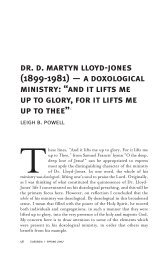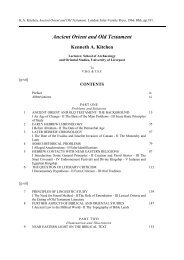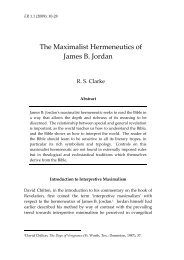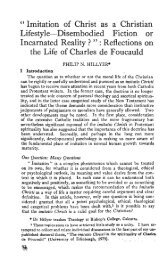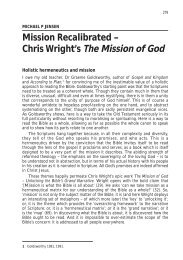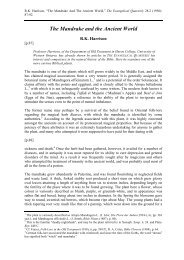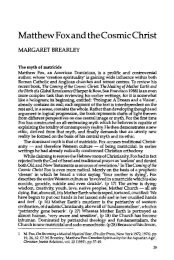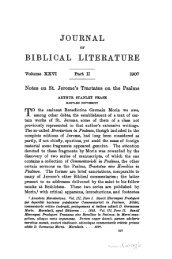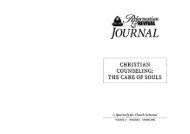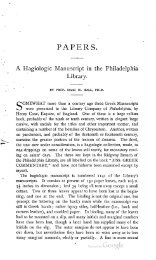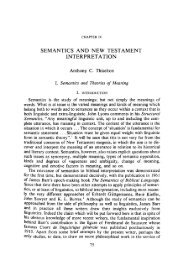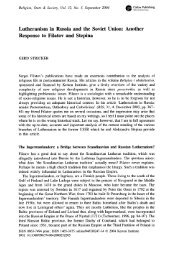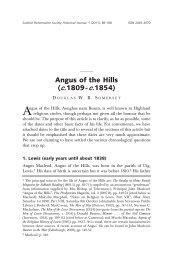The Language of the Epistle to the Hebrews as Bearing upon Its ...
The Language of the Epistle to the Hebrews as Bearing upon Its ...
The Language of the Epistle to the Hebrews as Bearing upon Its ...
Create successful ePaper yourself
Turn your PDF publications into a flip-book with our unique Google optimized e-Paper software.
LANGUAGE OF THE EPISTLE TO THE HEBREWS.<br />
5<br />
in <strong>the</strong> LXX, and apparently sufficiently <strong>of</strong>ten called for, are used in<br />
<strong>the</strong> N. T. only by S. Luke, S. Paul, and in Heb. <strong>The</strong> verb occurs<br />
only once in each <strong>of</strong> <strong>the</strong>m; Xa<strong>to</strong>vpyta is used once by S. Luke,<br />
3 times by S. Paul, and twice in Heb.; Xctrovpyos 3 times by S. Paul,<br />
twice in Heb.; while XELtOVPYtKOS occurs only once in <strong>the</strong> l<strong>as</strong>t;<br />
i.e. <strong>the</strong> whole group is used twice by S. Luke, 7 times by S. Paul, and<br />
6 times in Heb., and none <strong>of</strong> <strong>the</strong>m anywhere else. <strong>The</strong> much more<br />
important word /EotirrS is used only in S. Paul and Heb., 3 times in<br />
each. <strong>The</strong> same is true <strong>of</strong> 0/koXoyta, a word which might have been<br />
expected more frequently. <strong>The</strong>re seems <strong>to</strong> be nothing peculiar about<br />
<strong>the</strong> word ovet8Co-os found only in S. Paul (3 times), and in Heb.<br />
(twice). <strong>The</strong> words cratLS'a and 7raLt8vrs/ also occur only in <strong>the</strong>se<br />
writers, <strong>the</strong> former 4 times, <strong>the</strong> latter once in S. Paul; <strong>the</strong> former<br />
twice, <strong>the</strong> latter once in Heb. We are surprised <strong>to</strong> find such a word<br />
<strong>as</strong> i7rXqpo4opta only in <strong>the</strong>se writers, in each <strong>of</strong> <strong>the</strong>m twice. <strong>The</strong><br />
remarkable word vrroorra-ct,, afterwards in a different sense <strong>of</strong> so<br />
much importance <strong>the</strong>ologically, is also found only in <strong>the</strong>se writers,<br />
in S. Paul 3 times, in Heb. twice.<br />
Now this examination <strong>of</strong> common words h<strong>as</strong> some value, unless it<br />
can be, at le<strong>as</strong>t in some degree, paralleled by words common <strong>to</strong><br />
Heb. and <strong>the</strong> o<strong>the</strong>r N. T. writers. I do not find that it can be. On<br />
turning <strong>to</strong> <strong>the</strong> list I find but two words common only <strong>to</strong> any or <strong>to</strong> all<br />
<strong>of</strong> <strong>the</strong>m and <strong>to</strong> Heb., occurring more than once in each, and <strong>of</strong><br />
course a single occurrence <strong>of</strong> a word is <strong>of</strong> small value. One <strong>of</strong> <strong>the</strong>se<br />
is <strong>the</strong> purely accidental word 3i38o/xos, used twice in Heb. and 7 times<br />
elsewhere (5 times in Rev.), and <strong>the</strong> o<strong>the</strong>r is <strong>the</strong> more important<br />
word parrtLo-,rL' (always in <strong>the</strong> plural, = purifying ablutions) used<br />
twice by S. Mark and twice in Heb.<br />
Whatever value <strong>the</strong>re may be <strong>the</strong>refore in this examination <strong>of</strong><br />
common words is much incre<strong>as</strong>ed by <strong>the</strong> almost entire absence <strong>of</strong><br />
any such relation with <strong>the</strong> o<strong>the</strong>r N.T. writers. It seems <strong>to</strong> point,<br />
<strong>as</strong> far <strong>as</strong> it goes, <strong>to</strong> some sort <strong>of</strong> relation between <strong>the</strong> three writers<br />
S. Luke, S. Paul, and <strong>the</strong> author <strong>of</strong> Heb., and especially <strong>of</strong> <strong>the</strong><br />
two latter.<br />
We may now turn <strong>to</strong> o<strong>the</strong>r words <strong>of</strong> wider range which yet have<br />
something in <strong>the</strong>ir usage tending <strong>to</strong> show <strong>the</strong> style <strong>of</strong> <strong>the</strong> writer.<br />
<strong>The</strong> verb E'pXo/ma with its various compounds, abr'-, 7-r'-, e e t-, Ka'-,<br />
7rap'-, and ,rpoo-epXo/atc is naturally used more frequently in narrative.<br />
Making allowance for this, we are surprised at its relative frequency<br />
in Heb. and its infrequency in <strong>the</strong> Pauline epistles. <strong>The</strong> proportionate<br />
numbers are: Heb. 5I9; S. Luke, 656; S. Paul, I69; all o<strong>the</strong>rs, 708.




